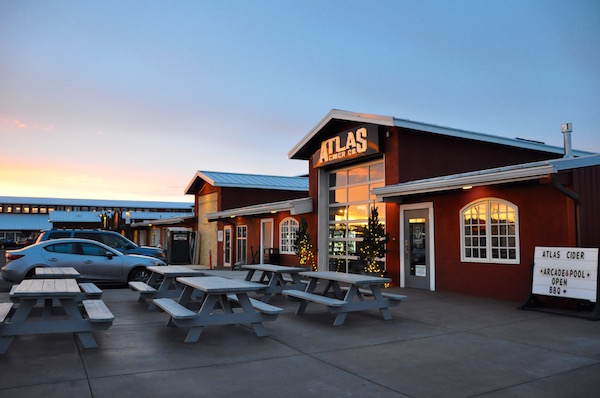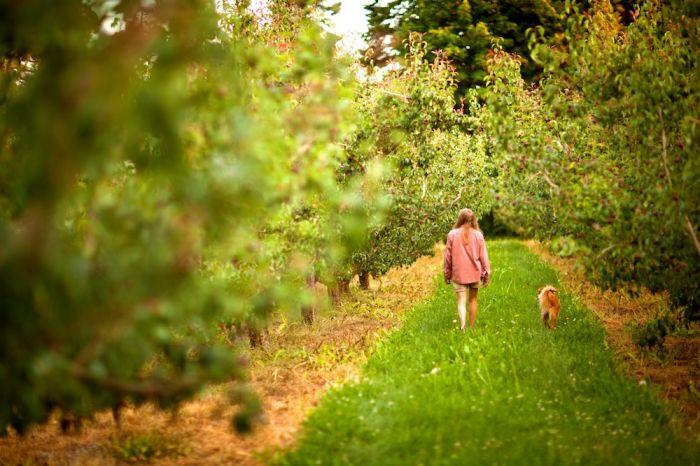written by Brian Yeager | photo by Kellie Standish
Part I: Case Study, Reverend Style
You may drive by the odd front yard apple tree in the blocks near Reverend Nat’s Cidery and Taproom, but with the buzz of traffic from Broadway and I-5, there is no mistaking this for a farmhouse cidery. Unlike rural cider producers planted amid the orchards in the Columbia River Gorge or the Willamette Valley, Portland’s urban cider makers tend to be bathed in shades of grey from cinder blocks, corrugated aluminum and chain link fences. They are also producing some fascinating non-farmhouse ciders.
This isn’t to say that urban cider makers can’t make exquisite, rustic ciders. It’s just that they seem to give themselves more liberty to play around with culinary ingredients and styles that appeal to a wide array of the tastes of city dwellers.
At Reverend Nat’s, the best-selling cider is also not exceedingly apple-tasting. Hallelujah Hopricot is off-dry and showcases citrusy Cascade hops and nectary apricots. Another popular concoction, Tepache, departs from fermented apples completely, and instead uses wild-fermented pineapple juice, modeled after a popular Mexican beverage. In fact, Rev Nat’s (as fans call them) recommends you blend it with a bit of Pacifico beer.
For the connoisseur looking for high-end offerings, Nat’s Eagle Rare Sacrilege Cider was a homerun in the form of a bourbon-aged sour cherry cider that was part of Reverend Nat’s “Tent Show” membership series of ultra limited bottles that sell for as much as $30. To offset that cost, they also put out the Cascadia Ciderworks United line of pint cans that retail for under three bucks.
The reverend behind this company’s array of offerings is Nat West, who attributes his success, in part, to following the craft beer industry’s model rather than the wine industry’s, despite cider actually being a form of wine.
“I talk to brewers all the time,” said West. “I see us as a section of the craft beer thing … I don’t make beer but I’m in the beer world.”
Thus, it’s no surprise that West created a cider-beer hybrid with eleven hop varieties called Envy, with the help of Barley Brown’s Brewing in Baker City. “The inspiration is that I love triple IPAs,” said West. He reduced the style points of these beers to: high alcohol content, large hop bill (creating flavor and aroma) and “some level of sweetness,” which comes from malted barley.
“There’re a lot of cider makers across the country who don’t like what we’re doing. They think it’s an aberration and not good for … the message of cider in America,” West said before taking a sip of Revelation Mountain Rose, a pink cider in his Revelation series of single-variety ciders. “We can capture people’s imagination about the possibility of cider. As well as: what is cider?” he mused.
Part 2: The Cider Gamut
- Cider Riot currently operates out of founder Abram Goldman-Armstrong’s North Tabor garage. At least it’s roomier than the dorm room where he first made cider at age 17. Goldman-Armstrong produces a cider called Never Give an Inch, made with the type of wild blackberries of the sort that thrive in the corners of parking lots. There’s a series packaged in two-liter “flagons” (or soda bottles to you and me) that retails for $12.99. Conversely, Cider Riot 1763 is a highly tannic cider in the English style made from Yamhill apples, an homage to Goldman-Armstrong’s parents, who planted an apple orchard in Yamhill in 1989. A gold foil-capped bottle with a quarter the volume, retails for about the same price as the two-liter cousin.
- Over in Southeast Portland, Bushwhacker Cider opened during the apple harvest of 2010 as the country’s first cider pub and more than a dozen others have followed these trailblazers. Their house-made ciders tend toward traditional English and French styles but that they also branch out with a yearly smoked cider with tweaks each time. The first iteration saw them taking apples across the street to Edelweiss, a German butcher and deli. The resulting cider from fruit smoked over alderwood had a distinct bratwurst quality.
- No one sells more cider in Oregon that Atlas Cider Co. in Bend. Bend is hardly a metropolis, but the cidery’s taproom on SW Industrial Way specializes in brightly-colored, fruit-forward flavors that often feature fruits other than apple. Think cherry pomegranate. They are also the first cidery to offer canned six-packs.
- Portland’s beer world is edging toward the cider world. HUB Cider hails from the city slickers behind Hopworks Urban Brewery. With “urban” right in the name, there’s no heirloom fruit pretense (although an impressive 60 percent of their juice is organic). Two other breweries, Craft Beer Alliance and Sasquatch Brewery, have also launched cider sides: Square Mile Cider Company and New West Cider, respectively.









We love Atlas Cider in their new cans. Great to support an Oregon family-run startup.